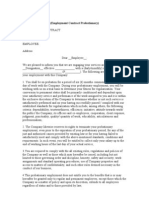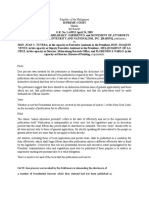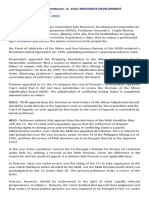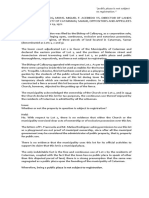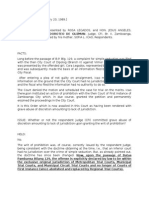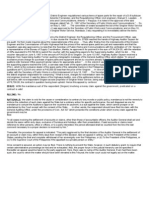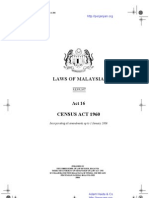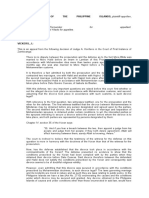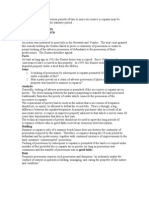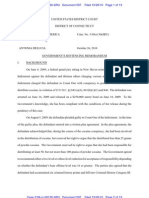2f Property Case Digests
2f Property Case Digests
Uploaded by
Beverly LegaspiCopyright:
Available Formats
2f Property Case Digests
2f Property Case Digests
Uploaded by
Beverly LegaspiOriginal Description:
Original Title
Copyright
Available Formats
Share this document
Did you find this document useful?
Is this content inappropriate?
Copyright:
Available Formats
2f Property Case Digests
2f Property Case Digests
Uploaded by
Beverly LegaspiCopyright:
Available Formats
G.R. No.
L-4827 May 31, 1979
GERARDO D. ABE-ABE, Et. Al., petitioners,
vs.
JUDGE LUIS D. MANTA of the Court of First Instance of Camiguin and PEDRO P. ROMUALDO,respondents.
FACTS:
On August 20, 1976, petitioners filed an injunction suit against Pedro P. Romualdo. The purpose of the suit
was to secure a judicial declaration as to the petitioners' prior vested rights under article 504 of the Civil Code to use
the water of the Anibungan Inobo Ablay and Tajong Crocks to irrigate their ricelands located upstream in Barrios
Lumad and Baylao Mambajao, Camiguin The petitioners sought to enjoin Romualdo from using the water of the
creeks at night to irrigate his two (2) hectare riceland located downstream. That nocturnal use was allegedly
prejudicial to the petitioners.
Their version is that their use of the water of the creeks started in 1938; that in 1952 or after the volcanic
eruption, the waters of the creeks were made to converge in a single channel and two diversion dams were. The
petitioners wanted to convey the impression that the communal irrigation system was established primarily for the
benefit of the ricelands located upstream.
Romualdo, in his answer, that at a conference held among the parties and it was agreed upon that the water
of the creeks would be used on a rotation basis wherein: the petitioners would use it in the daytime and Romualdo
and the other landowners downstream would use the water at night.
Romualdo alleged that he filed a water permit application with the district engineer's office so that he could
use legitimately the water to irrigate his riceland. In contrast, the petitioners did not file any water permit
applications although required to do so by the district engineer's office.
Romualdo interposed the defense that the lower court had no jurisdiction over the subject matter of the suit.
He contended that the petitioners' remedy was to file their complaint with the district engineer's office pursuant to
Department Order No. 245 dated September 29, 1958 of the Undersecretary of Public Works and Communications.
Romualdo also invoked PD No. 424, which created the National Water Resources Council and vested it with
powers to coordinate and integrate water resources development activities orto "determine, adjudicate, and grant
water rights". Romualdo argued that PD No. 424 repealed article 504 of the Civil Code which allows the acquisition
of the use of public waters by prescription for ten years.
ISSUE:
WON, the CFI of Camiguin has jurisdiction to adjudicate a dispute over water rights for irrigation purposes
even if the controversy has not yet been passed upon by the National Water Resources Council, the agency vested
with original and exclusive competence to resolve conflicting c on the appropriation of water resources.
HELD:
We hold that the petition is devoid of merit. It is incontestable that the petitioners' immediate recourse is to
ventilate their grievance with the National Water Resources Council which, as already noted, is the administrative
agency exclusively vested with original jurisdiction to settle water rights disputes-under the Water Code and under
Presidential Decree No. 424.
That jurisdiction of the Council under section 2(b) of Presidential Decree No. 424 is reaffirmed in section 88
of the Water Code and in section 3(d) thereof which provides that the utilization, exploitation, development,
conservation and protection of water resources shall be subject to the control and regulation of the government
through" the Council.
It should be noted that article 100 of the Water Code repealed the provisions of the Civil Code and the
Spanish Law of Waters of August 3, 1866 "on ownership of waters, easements relating to waters, use of public waters
and acquisitive prescription on the use of waters, which are inconsistent with the provisions of the Water Code.
Article 100 also repealed the Irrigation Law, Act No. 2152.
It is also noteworthy that section 3(e) of the Water Code recognizes that "preference in the use and
development of waters shall consider current usages and be responsive to the changing needs of the country".
You might also like
- Probation AgreementDocument4 pagesProbation AgreementGregorio Lappay Jr0% (1)
- Cacho v. CADocument2 pagesCacho v. CAReymart-Vin MagulianoNo ratings yet
- CD - Tanada V Tuvera G.R. No. L-63915 April 24, 1985Document2 pagesCD - Tanada V Tuvera G.R. No. L-63915 April 24, 1985KrizzaShayneRamosArqueroNo ratings yet
- CMPA Handbook For PhysiciansDocument56 pagesCMPA Handbook For Physiciansteena6506763No ratings yet
- Espinoza vs. CariñoDocument3 pagesEspinoza vs. CariñoKrisha Marie CarlosNo ratings yet
- Memorandum For RevisionDocument3 pagesMemorandum For RevisionMukesh Tomar50% (2)
- Camitan vs. Fidelity Investment Corporation PDFDocument15 pagesCamitan vs. Fidelity Investment Corporation PDFrapgracelimNo ratings yet
- US V Purganan (MR)Document6 pagesUS V Purganan (MR)NN DDLNo ratings yet
- Atok Big Wedge Mining Co Vs HON IAC Et Al - G.R. No. 63528 September 9, 1996Document17 pagesAtok Big Wedge Mining Co Vs HON IAC Et Al - G.R. No. 63528 September 9, 1996Jacinto Jr JameroNo ratings yet
- 3.) 97 Alauya v. ComelecDocument2 pages3.) 97 Alauya v. ComelecVener Angelo MargalloNo ratings yet
- Title Vi SalesDocument38 pagesTitle Vi SalesSHeena MaRie ErAsmoNo ratings yet
- Mosqueda V Pilipino Banana Growers and Exporters Association, GR No. 189185, Aug 16, 2016Document36 pagesMosqueda V Pilipino Banana Growers and Exporters Association, GR No. 189185, Aug 16, 2016Jacquilou Gier MacaseroNo ratings yet
- Kuenzle & StreiffDocument2 pagesKuenzle & Streiffaerwincarlo4834No ratings yet
- Petitioners vs. vs. Respondent Menandro Quiogue Jose Ma. Recto Paterno R. CanlasDocument5 pagesPetitioners vs. vs. Respondent Menandro Quiogue Jose Ma. Recto Paterno R. CanlasClintNo ratings yet
- Laidziii: Case Digest in Oblicon - ADocument2 pagesLaidziii: Case Digest in Oblicon - ANaoimi LeañoNo ratings yet
- Panganiban, J.:: (G.R. No. 148267. August 8, 2002)Document6 pagesPanganiban, J.:: (G.R. No. 148267. August 8, 2002)Mary Denzyll BunalNo ratings yet
- 2008 Election ReviewDocument71 pages2008 Election ReviewVincent De VeraNo ratings yet
- Arts 457 465 3Document6 pagesArts 457 465 3Rocky YapNo ratings yet
- Twentieth Century Music Corporation v. George Aiken, 422 U.S. 151 (1975)Document15 pagesTwentieth Century Music Corporation v. George Aiken, 422 U.S. 151 (1975)Scribd Government DocsNo ratings yet
- Citystate Savings Bank v. Teresita Tobias GR No. 22790 Reyes, JR., JDocument7 pagesCitystate Savings Bank v. Teresita Tobias GR No. 22790 Reyes, JR., JAnastasia ZaitsevNo ratings yet
- Calapan Lumber Co. v. Community Sawmill Co., G.R. No. L-16351, June 30, 1964Document2 pagesCalapan Lumber Co. v. Community Sawmill Co., G.R. No. L-16351, June 30, 1964Al Jay MejosNo ratings yet
- Crisologo V PeopleDocument3 pagesCrisologo V PeopleYanne AriasNo ratings yet
- Latest LNR CasesDocument263 pagesLatest LNR CaseslycheemelonNo ratings yet
- Consti1 - Justice Antonio NachuraDocument20 pagesConsti1 - Justice Antonio NachuraLorelei B RecuencoNo ratings yet
- Bishop of Calbayog vs. Municipality of Catarman and Director of LandsDocument1 pageBishop of Calbayog vs. Municipality of Catarman and Director of LandswupwupwupNo ratings yet
- Hijo Plantation V Central BankDocument15 pagesHijo Plantation V Central BanklazylawstudentNo ratings yet
- Jagualing v. CADocument2 pagesJagualing v. CAmmgvNo ratings yet
- Marcopper Mining VsDocument14 pagesMarcopper Mining VsIrish MartinezNo ratings yet
- Constitutional LimitationsDocument32 pagesConstitutional LimitationsXyleeApiladoNo ratings yet
- ORIENT AIR SERVICES V CADocument1 pageORIENT AIR SERVICES V CAEmmanuel YrreverreNo ratings yet
- First Refusal CasesDocument6 pagesFirst Refusal CasesAriel Mark PilotinNo ratings yet
- Mateo Cariño vs. Insular GovernmentDocument1 pageMateo Cariño vs. Insular GovernmentPrinston Del CampoNo ratings yet
- CHAVEZ V Public Estates AuthorityDocument1 pageCHAVEZ V Public Estates AuthorityMis DeeNo ratings yet
- DOCTRINE: The Fideicommissary Substitution Requires Three ThingsDocument3 pagesDOCTRINE: The Fideicommissary Substitution Requires Three ThingsRoland MarananNo ratings yet
- Alzona Vs Capunitan 4 SCRA 450 Page 22Document3 pagesAlzona Vs Capunitan 4 SCRA 450 Page 22Manok PhilmusicNo ratings yet
- Legados Vs de GuzmanDocument2 pagesLegados Vs de GuzmanMaria Cherrylen Castor QuijadaNo ratings yet
- Velez vs. Velez, G.R. No. 187987, November 26, 2014Document3 pagesVelez vs. Velez, G.R. No. 187987, November 26, 2014JMXNo ratings yet
- National Food Authority v. IACDocument2 pagesNational Food Authority v. IACJune Vincent Ferrer IIINo ratings yet
- Republic V Bibonia DigestDocument2 pagesRepublic V Bibonia DigestHeart NuqueNo ratings yet
- Concealement PolicyDocument15 pagesConcealement PolicypogsNo ratings yet
- Ma. Vilma F. Maniquiz vs. Atty. Danilo C. Emelo A.C. No. 8968, September 26, 2017 FactsDocument2 pagesMa. Vilma F. Maniquiz vs. Atty. Danilo C. Emelo A.C. No. 8968, September 26, 2017 FactsEduardNo ratings yet
- West Tower Vs FPICDocument25 pagesWest Tower Vs FPICkarlNo ratings yet
- 5 - Tumalad v. VicencioDocument1 page5 - Tumalad v. VicencioValentine MoralesNo ratings yet
- Telecommunications and Broadcast Attorneys of The Philippines, Inc. and GMA Network, Inc. vs. Commission On ElectionsDocument10 pagesTelecommunications and Broadcast Attorneys of The Philippines, Inc. and GMA Network, Inc. vs. Commission On ElectionsMary Kathlein SagadalNo ratings yet
- Republic V LagramadaDocument7 pagesRepublic V LagramadaanamergalNo ratings yet
- 29) Berg v. Magdalena Estate, Inc.Document8 pages29) Berg v. Magdalena Estate, Inc.Margreth MontejoNo ratings yet
- Agustin vs. Bacalan 135 Scra 340Document11 pagesAgustin vs. Bacalan 135 Scra 340albemartNo ratings yet
- 19 Republic Vs Vda de CastellviDocument2 pages19 Republic Vs Vda de CastellviBernard BeldadNo ratings yet
- Telfast v. CastroDocument7 pagesTelfast v. CastroKathNo ratings yet
- Collado Vs CA - Digested - EltonDocument3 pagesCollado Vs CA - Digested - EltonElton John S. BonsucanNo ratings yet
- Case #18. The Easement of Light in The Case of Windows Opened in One's Own Wall Is NegativeDocument2 pagesCase #18. The Easement of Light in The Case of Windows Opened in One's Own Wall Is NegativeArbie ReyesNo ratings yet
- Bicera V TenezaDocument1 pageBicera V TenezaJoshua LanzonNo ratings yet
- Petitioner Vs Vs Respondent: Third DivisionDocument8 pagesPetitioner Vs Vs Respondent: Third Divisionbrandon dawisNo ratings yet
- Case Summaries - Pledge To AntichresisDocument8 pagesCase Summaries - Pledge To AntichresisKarla BeeNo ratings yet
- Pearl and Dean (Phil.) Inc. vs. Shoemart Inc. (GR 148222, 15 August 2003) Facts: Pearl and Dean (Phil.), Inc. Is A CorporationDocument5 pagesPearl and Dean (Phil.) Inc. vs. Shoemart Inc. (GR 148222, 15 August 2003) Facts: Pearl and Dean (Phil.), Inc. Is A Corporationeinel dcNo ratings yet
- Sayson v. SingsonDocument1 pageSayson v. SingsonJilliane OriaNo ratings yet
- Integrated Reaty Corp. Vs PNBDocument8 pagesIntegrated Reaty Corp. Vs PNBaudreyracelaNo ratings yet
- Proceedings Before The Municipal Trial Court in Cities (MTCC)Document3 pagesProceedings Before The Municipal Trial Court in Cities (MTCC)Paul Joshua Torda SubaNo ratings yet
- C. 1. Marimperio vs. CADocument1 pageC. 1. Marimperio vs. CARhea CalabinesNo ratings yet
- CDC Vs MateoDocument1 pageCDC Vs MateoVanya Klarika NuqueNo ratings yet
- Natres-9-Water Code Final Compilation of Cases in Water CodeDocument16 pagesNatres-9-Water Code Final Compilation of Cases in Water CodeMekiNo ratings yet
- Abe-Abe vs. MantaDocument5 pagesAbe-Abe vs. MantaRMC PropertyLawNo ratings yet
- Valisno v. AdrianoDocument5 pagesValisno v. AdrianoaltheavergaraNo ratings yet
- Codal NotesDocument4 pagesCodal NotesliboaninoNo ratings yet
- Cruz Vs DENRDocument6 pagesCruz Vs DENRBeverly LegaspiNo ratings yet
- G.R. No. 110571 March 10, 1994 First Lepanto Ceramics, Inc., Petitioner, V. The Court of Appeals and Mariwasa MANUFACTURING, INC., RespondentsDocument5 pagesG.R. No. 110571 March 10, 1994 First Lepanto Ceramics, Inc., Petitioner, V. The Court of Appeals and Mariwasa MANUFACTURING, INC., RespondentsBeverly LegaspiNo ratings yet
- Crispin Oben For Petitioner. Estanislao A. Fernandez For Respondent Rivera. J.Document5 pagesCrispin Oben For Petitioner. Estanislao A. Fernandez For Respondent Rivera. J.Beverly LegaspiNo ratings yet
- 3&epubltc of TbeDocument13 pages3&epubltc of TbeBeverly LegaspiNo ratings yet
- GR 214752 2016 PDFDocument8 pagesGR 214752 2016 PDFBeverly LegaspiNo ratings yet
- AlmedaDocument5 pagesAlmedaBeverly LegaspiNo ratings yet
- G.R. No. 173864Document3 pagesG.R. No. 173864Beverly LegaspiNo ratings yet
- Santos Vs MojicaDocument1 pageSantos Vs MojicaEANo ratings yet
- MAHAREAT Regulations 2019 UpdatedDocument32 pagesMAHAREAT Regulations 2019 UpdatedVijay DabhadeNo ratings yet
- Census Act 1960 (Act 16)Document15 pagesCensus Act 1960 (Act 16)Adam Haida & CoNo ratings yet
- Affdavit For Temporary Injunction ArumugamDocument4 pagesAffdavit For Temporary Injunction ArumugamfredrickNo ratings yet
- Republic v. Miller, GR 125932Document4 pagesRepublic v. Miller, GR 125932Anna NicerioNo ratings yet
- OSMEÑA VS RAMA DigestDocument1 pageOSMEÑA VS RAMA Digestcmv mendoza100% (1)
- People Vs BidtuDocument3 pagesPeople Vs BidtuAnonymous ubixYANo ratings yet
- IGOR KOMISARCHIK 1425 Colorado Ave 309 Main ST 651-260-7890 952-938-0730 Minnesota Notary ApplicationDocument2 pagesIGOR KOMISARCHIK 1425 Colorado Ave 309 Main ST 651-260-7890 952-938-0730 Minnesota Notary ApplicationCamdenCanaryNo ratings yet
- People v. Enrico MirondoDocument8 pagesPeople v. Enrico MirondoMau AntallanNo ratings yet
- Howard v. KuntoDocument2 pagesHoward v. Kuntologden87No ratings yet
- Volterra Semiconductor v. Primarion Patent MSJDocument147 pagesVolterra Semiconductor v. Primarion Patent MSJNorthern District of California BlogNo ratings yet
- United States v. Tammy Payton, 4th Cir. (2013)Document3 pagesUnited States v. Tammy Payton, 4th Cir. (2013)Scribd Government DocsNo ratings yet
- WPM International V LabayenDocument2 pagesWPM International V LabayenSherwinBries75% (4)
- AppealDocument6 pagesAppealSiragi KigoziNo ratings yet
- Red and Yellow Omnibus Co. Sdn. Bhd. & Anor. v. Chuah Lay Boon CLJ - 1993!2!480Document6 pagesRed and Yellow Omnibus Co. Sdn. Bhd. & Anor. v. Chuah Lay Boon CLJ - 1993!2!480Alae KieferNo ratings yet
- Plea Bargain by David Christopher GiwaDocument9 pagesPlea Bargain by David Christopher GiwaDAVID GIWANo ratings yet
- Garcia v. Molina&Velasco G.R. No. 157383 - G.R. No. 174137Document8 pagesGarcia v. Molina&Velasco G.R. No. 157383 - G.R. No. 174137Mannor ModaNo ratings yet
- Trump WaivesDocument2 pagesTrump WaivesNational Content Desk100% (1)
- Re Request of Heirs of Passengers of Dona PazDocument1 pageRe Request of Heirs of Passengers of Dona PazJillian AsdalaNo ratings yet
- Exam For Fundamentals of Inv.Document18 pagesExam For Fundamentals of Inv.Qayes Al-Quqa100% (2)
- DeLUCIA Antonia Govt Sentencing MemoDocument13 pagesDeLUCIA Antonia Govt Sentencing MemoEditor, Hartford CourantNo ratings yet
- G.R. No. 70623 PDFDocument6 pagesG.R. No. 70623 PDFAlex Viray LucinarioNo ratings yet
- Amity Memo.respondent Final #Document39 pagesAmity Memo.respondent Final #naikyashwini005No ratings yet
- CoAd 12 Module 3Document6 pagesCoAd 12 Module 3Jenerwin Ottao Nera NeraNo ratings yet
- PEI Mid-Point Police Review Final ReportDocument52 pagesPEI Mid-Point Police Review Final ReportAbbie JenkinsNo ratings yet
- Metrobank Vs Absolute Management CorporationDocument2 pagesMetrobank Vs Absolute Management CorporationParis Valencia100% (1)
